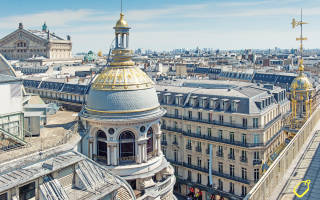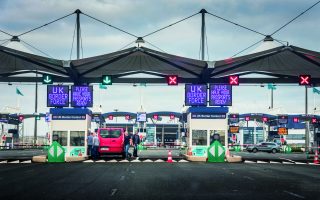Motoring in France
Motoring experts, including Paul Lamarra, explain what to do if things go wrong on a driving holiday in France
Almost 20 million visitors from the UK will enjoy a holiday in France this year and more and more are discovering just how easy it is to drive through the wide open spaces of l’Hexagone. The vast majority have no problems, but difficulties can arise, so with the help of Miranda Schunke of Green Flag and Gavin Hill-Smith of the AA, we explain how to cope in some of those situations.
I have been stopped by a police officer and told that I have committed a traffic offence – what happens next?
The officer will outline the offence and, if it is minor, the size of the on-the-spot fine. If you do not have the means to pay you will either be escorted to a bank or have your driving licence retained and be sent alone. The officer is also likely to check that your documents are in order and that the vehicle is carrying the necessary equipment for driving in France (see panel opposite). You should receive a ticket, a receipt and a stern warning. A more serious offence could result in your arrest, your licence being suspended and the car being confiscated.
What size of fine can I expect?
Speeding fines start from €68 for going less than 20km/h over the limit outside of a 50km/h zone. Within a 50km/h zone the fine rises to €135. Drive at more than 50km/h over the limit and the fine is €1,500. Most offences in-between will attract a €135 fine.
I think I have been flashed by a speed camera. Will I be fined and have points added to my licence?
For the time being only drivers from Belgium, Luxembourg, Spain and Switzerland can be fined and have points added when caught speeding by a fixed camera. However, this does not apply to mobile cameras manned by police.
What can I do if I have lost the autoroute toll ticket or it won’t accept my payment?
A lost ticket can mean paying the maximum amount for that stretch of motorway, but this will often be the sum due anyway for motorists driving long distances. With small toll charges there is often a basket into which you can throw the correct change. Trying to feed notes into the machine can be frustrating when it keeps coming back out. Using a credit card is best. Just give it to the attendant or pop it in the slot; there’s no need to enter your pin. The toll booths (péages) accept most currencies and credit cards. If you have lost your ticket, or your payment method isn’t accepted press the ‘help’ button or look for the assistant, who is usually present at the larger automated péage. If your payment method is not accepted, you can sign a reconnaissance de dette, which obliges you to pay within ten days.
Can I use the télépéage (automated toll lanes)?
Foreign drivers can now sign up for the Liber-t scheme. For a maximum annual fee of €16 (plus VAT), an initial registration fee of €10 and a €20 refundable deposit you can obtain a Liber-t tag and use the automated toll lanes without having to stop. You will receive a monthly bill payable in pounds sterling. The tag won’t save you money, but it will save time and it is transferable between cars.
What happens if I break down on the autoroute or the périphérique in Paris?
Call for help using one of the emergency phones placed at two-kilometre intervals. Unlike in the UK it is not possible to organise your own recovery, because in French law a garage on the police rota must attend breakdowns on the autoroute. Between 8am and 6pm you will be charged €120 for being towed to a service area, the repair company’s garage or a location within five kilometres of the autoroute. The price also includes 30 minutes of on-the-spot repair work. Parts are extra and any additional work will be charged at the repair company’s rates. The charge rises to €180 for night-time callouts.These costs are normally refundable if you have European breakdown cover.
What happens if I have a puncture?
Make sure you don a reflective jacket and set up the warning triangle. You can try to change the tyre yourself. On French-registered vehicles it is obligatory to replace both tyres on an axle if a puncture cannot be repaired safely. However, expect the garage to insist on replacing both, even for British-registered vehicles. Tyres cost around €200 a pair.
I feel very tired. How far is it to the next service station on the autoroute and how long can I stay?
The maximum distance between stations is 60 kilometres, although the average interval is 15 kilometres. An aire de service usually offers fuel, toilets and refreshments whereas an aire de repos is somewhere to pull over or have a picnic. There is no limit on the length of your stay.
How do I know when I should give way to the right?
Roundabouts have worked in the same way as in the UK for a while, but there are places where you do still have to give way to traffic entering from the right. These include the périphérique, villages where the speed limit is 30 km/h and there are no markings, and at unmarked rural crossroads where a red triangle containing a black X is displayed. Priorité à droite has often been retained or re-introduced as a traffic-calming measure and you should drive calmly and slowly in an urban area.
What can I do if my car has been clamped or impounded?
Go to the nearest police station and explain what has happened. The officer will assist you in what to do next.
Do I need extra insurance for the trip and do I need to tell my insurance company?
Under EU rules every car insurance policy must provide at least third-party cover throughout the EU. Check your policy and if you need to increase your cover to fully comprehensive for driving abroad it may be necessary to pay an additional premium or buy a Green Card.
What is the best thing to do if I get lost?
Ask a local, a police officer or pop into a shop and ask for help. If you are relying on a GPS device it must not warn you of speed cameras. This function must at the very least be disabled, but installing new software is the safest option. Failure to comply will attract a heavy fine.
What should I do in the event of a crash?
If someone is injured call the emergency services on 112 or from one of the orange phones by the autoroute. Don reflective jackets and get everyone who is unhurt to a place of safety – behind a safety barrier if possible. Do not cross the autoroute and under no circumstances leave the scene. For collisions that do not result in injury fill out a constat amiable d’accident – an amicably agreed version of events. Do not allow anyone else to fill it out, do not sign anything unless you understand it and be aware of the potential for informal agreements to be reneged upon. Filling out the constat is not obligatory, but your insurance company will probably issue you with one. Contact your insurance company as soon as possible for advice.
Share to: Facebook Twitter LinkedIn Email


